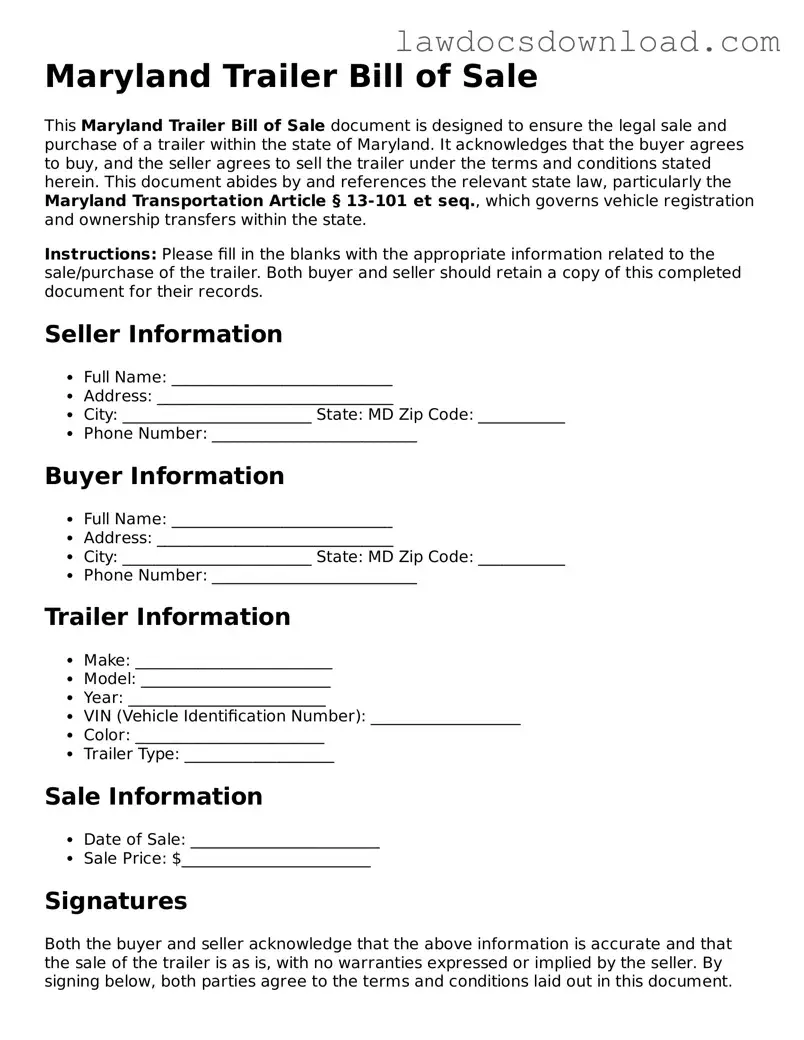The Maryland Trailer Bill of Sale form is closely related to the Vehicle Bill of Sale, which functions as a legal record documenting the sale and transfer of ownership of a vehicle from a seller to a buyer. Both forms typically include vital information such as the make, model, year, and VIN (Vehicle Identification Number), ensuring that the transaction is officially recorded and recognized by legal and governmental authorities. This ensures that the new owner has proof of purchase and legal ownership.
Similarly, the Boat Bill of Sale mirrors the function of the Trailer Bill of Sale, but specifically pertains to the transaction of boats. It details the sale and transfer of ownership of a boat, including necessary specifics like the hull identification number, length, make, and year. This document serves as essential proof for registration, legal ownership, and may even be required for insurance purposes, akin to the trailer bill of sale.
Another analogous document is the Motorcycle Bill of Sale. Like the trailer version, it records the transaction details between the buyer and seller of a motorcycle, including information on the model, make, year, and identification number. This document is critical for the buyer to register the motorcycle in their name, proving ownership and facilitating any future sale or insurance claims.
The Firearm Bill of Sale also shares similarities with the Trailer Bill of Sale, as it legally documents the sale and transfer of a firearm from one individual to another. It includes detailed information like the make, model, caliber, and serial number of the firearm, serving as a vital record for ownership and potentially required for background checks and registrations, echoing the importance of documentation found in the trailer bill of sale.
The General Bill of Sale is a broader document that encompasses a variety of personal property sales, including trailers, but is not limited to vehicles or boats. It typically includes descriptions of the item sold, the sale amount, and the parties involved. Its flexibility makes it applicable in many types of private sales transactions, offering a framework akin to the trailer bill of sale but for a wider array of items.
An Equipment Bill of Sale is also related, specifically detailing the sale and transfer of ownership of equipment, which can range from agricultural to construction items. Like the trailer bill of sale, it captures essential details about the equipment, such as make, model, and serial number, ensuring the new owner has a valid proof of purchase and ownership, critical for both inventory and legal purposes.
The last notable document similar to the Maryland Trailer Bill of Sale is the Pet Bill of Sale. While it might seem less intuitive compared to vehicle or equipment sales, this document formalizes the sale and transfer of ownership of pets, detailing the animal's breed, date of birth, health information, and more. Like the trailer bill of sale, it provides legal proof of the transaction and establishes the buyer as the new rightful owner, important for registration, breeding rights, and veterinary care.

